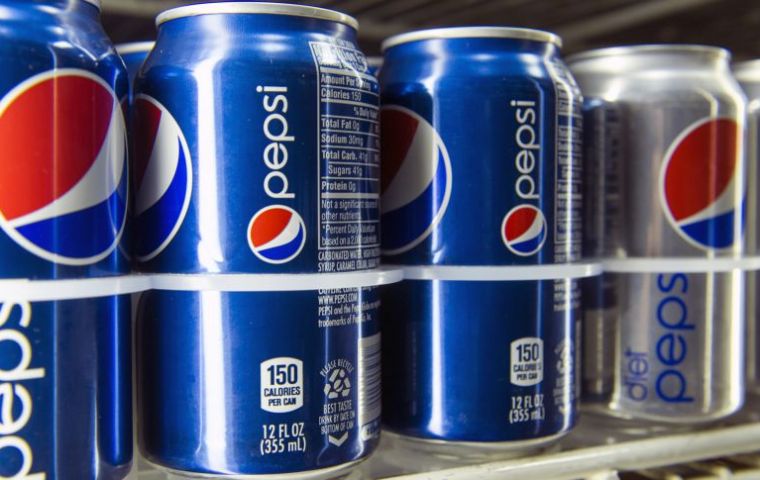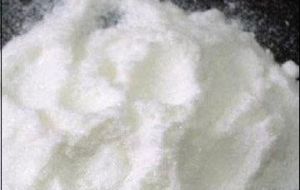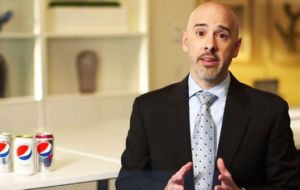MercoPress. South Atlantic News Agency
Pepsi changes artificial sweetener over consumer concerns about its safety
 PepsiCo says its decision is a commercial one, responding to consumer preferences. Last year, sales in Diet Pepsi fell by more than 5% in the US.
PepsiCo says its decision is a commercial one, responding to consumer preferences. Last year, sales in Diet Pepsi fell by more than 5% in the US.  The company said it will replace aspartame with another sweetener - sucralose - mixed with acesulfame potassium (Ace-K).
The company said it will replace aspartame with another sweetener - sucralose - mixed with acesulfame potassium (Ace-K).  Seth Kaufman, vice-president of Pepsi, said: “Aspartame is the number one reason consumers are dropping diet soda”.
Seth Kaufman, vice-president of Pepsi, said: “Aspartame is the number one reason consumers are dropping diet soda”. A controversial artificial sweetener is being removed from Diet Pepsi in the US amid consumer concerns about its safety. Aspartame-free cans of the drink will go on sale from August in America, but not in Britain. However regulators in the UK and the US insist aspartame is still safe to use in soft drinks.
PepsiCo says its decision is a commercial one, responding to consumer preferences. Last year, sales in Diet Pepsi fell by more than 5% in the US. Similarly, sales of Diet Coke, which also contains aspartame, decreased by more than 6%.
PepsiCo says it will replace aspartame with another sweetener - sucralose - mixed with acesulfame potassium (Ace-K).
Seth Kaufman, vice-president of Pepsi, said: “Aspartame is the number one reason consumers are dropping diet soda”.
In tests, Mr Kaufman said, people still recognized the reformulated drink to be Diet Pepsi but it might have a “slightly different mouth-feel”.
The change only applies to the US market and will affect all varieties of Diet Pepsi, such as Caffeine Free Diet Pepsi and Wild Cherry Diet Pepsi. It will not apply to other PepsiCo drinks, such as Diet Mountain Dew.
Aspartame has sparked controversy since it was first approved for use in the 1980s, despite being one of the most thoroughly tested and studied food additives. Aspartame, also known as E951, is about 200 times sweeter than sugar but contains very few calories.
Thousands of foods and drinks around the world use it as a sugar substitute, including breakfast cereals and sugar-free chewing gum. Food safety experts have been keeping its use under close scrutiny since a number of anecdotal reports pointed to potential side-effects.
A study published by the Ramazzini Foundation in Bologna, Italy, in July 2005 claimed to have shown that rats given dosages of aspartame equivalent to those in humans may develop tumors. But European regulators who assessed this research were not convinced by it and concluded that aspartame could still be used as a food additive.
The US Food and Drug Administration says there are more than 100 studies that support aspartame's safety. But regulators agree that there should be a limit to how much of the sweetener people consume.
An adult would have to consume 14 cans of a sugar-free drink every day to reach this limit. There are some people who cannot safely consume aspartame. These are people with an inherited disease called phenylketonuria or PKU. People with PKU are unable to metabolize a component of aspartame.




Top Comments
Disclaimer & comment rules-

-

Read all commentsWhy not use Glucose... it's a monosaccharide, unlike sucrose that's a disaccharide...It's an important nutrient.... and it is the major energy source for brain cells.
Apr 29th, 2015 - 12:11 am 0Let me guess...it's more expensive than artificial sweeteners...
If the experts say its safe,
Apr 29th, 2015 - 01:10 pm 0then you can officially take it, that it is NOT safe.
Commenting for this story is now closed.
If you have a Facebook account, become a fan and comment on our Facebook Page!